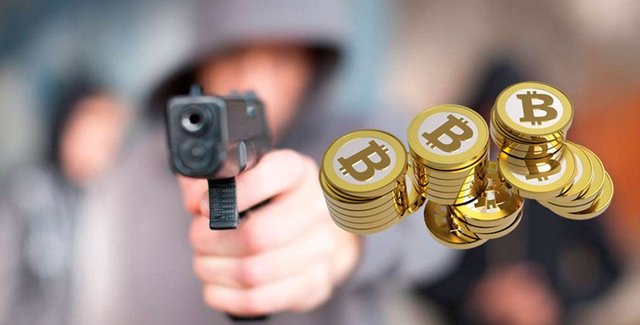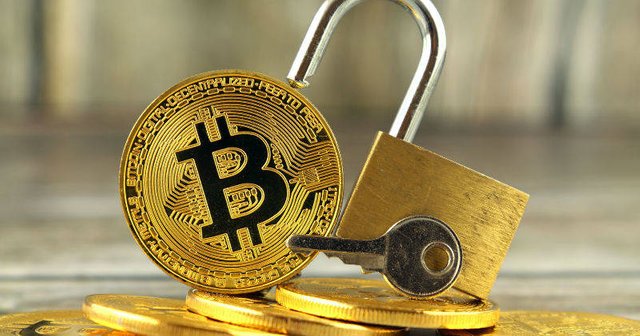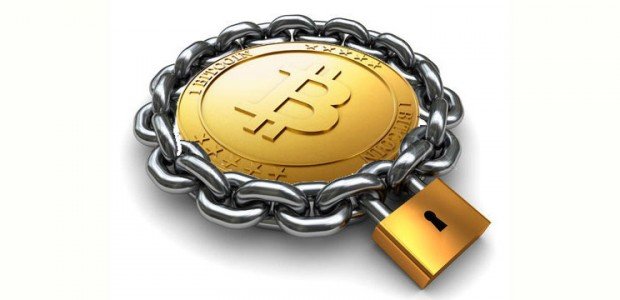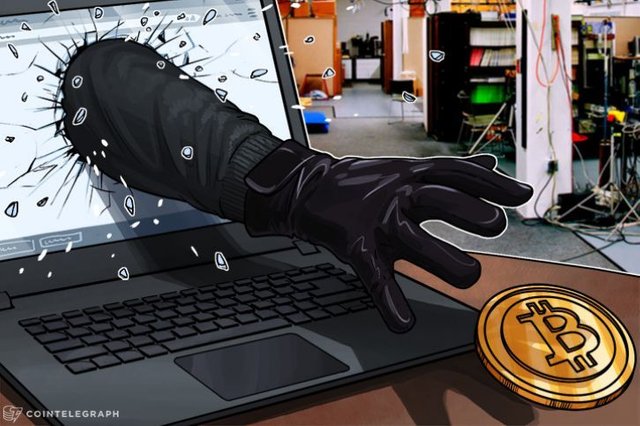Cryptoeconomics has brought greater security in transactions with distributed accounting, as well as the possibility of anonymity in financial transactions. In particular, being able to make transfers and payments anonymously provides great advantages in favor of the privacy of cryptocurrency users.
But you know that we never stop warning you that the future is always unpredictable, and that no software (and Bitcoin is) can be 100% designed for the future use that you will end up giving. In fact, anonymity is proving to also have a sinister B-side, which is beginning to pose a risk to the physical security of Bitcoiners.
Security has been a serious problem since the birth of Bitcoin. For example, in December 2013, some cyber thieves stormed Sheep Marketplace and stole 96,000 Bitcoins worth about $ 56.4 million. Due to the very nature of Bitcoin, it can be quite difficult to store safely. This also applies to exchanges.
Unlike the traditional financial system, there is no third party that can reverse a charge or restore your account balance if you lose Bitcoins or are stolen. The users are responsible for their own security. Bitcoin holders without professional knowledge about the cryptocurrency should choose a reliable platform to store and market their Bitcoins and other cryptocurrencies.
Secondly, Bitcoin holders with a large number of Bitcoins should be more attentive not only to the security of their accounts but also to the security of their personal computers. They must install the latest antivirus software and change the passwords regularly. Last but not least, Bitcoin owners must encrypt their accounts to improve account security.
The first known case of physical robbery with virtual theft occurred a few months ago in NYC

The issue is that this supposed physical insecurity brought by Bitcoin are not ethereal speculations without foundation: the reality is that Bitcoin has also brought new forms of crime. These new forms of crime are not limited only to the numerous cases of theft of cryptocurrencies on the Internet, or ransomware that requires payment in Bitcoins. There are also live robberies live and whose sole purpose is to steal from the victim their precious (and anonymous) Bitcoins.
The first alarms jumped when a few months ago in New York was the first case of express kidnapping of a person with its cryptotokens as a target. The criminals knew that this person kept an important part of their money in Ethers, and they kidnapped him with the purpose of transferring his tokens to a crypto-port controlled by the kidnappers during the brief captivity.
Louis Meza, the victim, met with a friend of his in his apartment for reasons that are unknown. He then went outside and climbed into a van that was supposed to be from a transport company. The van not only did not take him anywhere, but inside he was waiting for a person who told him at gunpoint that he should give him his wallet (physical), his house keys, and his mobile phone.
Then the criminals entered the apartment and took the keys that guaranteed access to the virtual wallet of the victim and their long-awaited Ethers. Totally anonymous Ethers worth $ 1.8 million were transferred to a virtual wallet controlled by the criminals. The anonymity of the tokens served as shield to the robbers to leave no trace of their action, but the involvement of the friend with whom the victim met allowed to open an investigation that resulted in the arrest of the criminals who perpetrated the robbery.
The cases of face-to-face robberies in Bitcoins begin to proliferate

But the previous case has not been precisely an isolated case. Lately the cases of physical robberies with virtual theft have proliferated. The characteristics of anonymity provided by cryptocurrencies are the ideal breeding ground for this proliferation, in addition to the mobility and availability of access to their tokens at all times by users.
A few days after the case of the express kidnapping in Manhattan, Pavel Lerner, a manager of a cryptocurrency broker, was kidnapped during his stay in Kiev by six armed hooded men who forced him into a van with stolen license plates. The modus operandi was very similar to the previous case, as well as the motive of the kidnapping. Lerner's company ended up paying a ransom in Bitcoins that amounted to a $ 1 million change.
Later there have been more similar cases, in which the victims have been held against their will, and have only been released after transferring their cryptocurrencies to virtual portfolios controlled by the criminals. The New York Times has made a detailed summary of most of them, ranging from the kidnapping in your room of a Russian tourist in a holiday resort in Phuket (Thailand) with a ransom that amounted to $ 100,000 in Bitcoins, to the extent occurred in Palm Beach (Florida) with a theft of $ 28,000.
All happening also for other cases like that of a Turkish businessman whose vehicle assaulted some gunmen in the middle of a street in Istanbul and stole Bitcoins worth 3 million dollars, that of a trader resident in Oxford (United Kingdom), or that of a cryptointermediary from Ottawa (Canada). Every time there are more and more cases of a form of delinquency centered on decentralized cryptocurrencies (worth the paradox).
The new forms of delinquency force to design new ways to prevent it (and combat it)

As is almost always the case, legislation and specific police measures are behind the development of events. That is why, in the meantime, unfortunately falls on citizens and users the responsibility of, for their own good, adopt the most appropriate prevention measures in order to minimize the likelihood of falling victim to this new type of crime.
Very aware of this type of problems early, before this new type of crime emerged, in Blog Salmón a few months ago we wrote a detailed analysis entitled "Is it safe to use Bitcoins or is there always risk of stealing purses from crypto-currencies ?. In this interesting article we analyze all the options for storage and custody of your cryptocurrencies, with their pros and cons.
On the basis of this analysis, we now specify the most appropriate way (as far as possible) to take action against these express kidnappings or robberies with virtual mobile. The first thing to do is avoid having instant or online access to the bulk of your cryptocurrencies. Of course, this point is uncomfortable and not very agile, but it guarantees a level of non-immediacy that can throw the friends of your Bitcoins far behind.
The infrastructure that criminals need to get their tokens if you can access them at any time is to keep a few minutes in a room or vehicle. If, on the other hand, you make your own access to your cryptocurrencies difficult, it also makes difficult (and a lot) the ease and immediacy of a possible robbery or kidnapping, considerably increasing the risks to be assumed by the criminals. Security versus discomfort: that is neither more nor less the exchange.
The most appropriate measures that you can take as a crypto user

In the previous analysis we talked about cold storage options with tokens guarded in underground bunkers, and with deferred access to their cryptocurrencies after having requested their withdrawal. This option, while adding a degree of difficulty for criminals, can be a double-edged sword, since you can still access your Bitcoins from anywhere, including from where you are held by your captors.
Deferred withdrawal may end up having the opposite effect, and result in the criminals going to prolong the agony of their kidnapping during the day or two that it takes you to be able to withdraw their tokens from your Smartphone, and dispose of them to transfer them to the virtual wallet controlled by criminals.
Indeed, if you have your money in a bank account, with the help of online banking, you are exposed to an (apparently) similar risk. But it is not exactly the same. The fact that traditional banking is composed of centralized entities, makes them intensively monitor suspicious transactions, and contact customers and have protocols to verify the situation. This in the cryptoeconomy can not happen, since it is decentralized by nature, and no entity supervises its transactions today.
However, counting on this, one can think of taking advantage of the advantages of decentralized currencies, without giving up the security of having a traditional depository entity. In the previous analysis on storage of tokens, we exposed you as a safer option of cold storage in a paper or paper wallet that you must guard properly.
Indeed, this would not have prevented the previous case of robbery of Ethers in New York, but if you store that "paper wallet" in a safe deposit box rented in a bank office as we also suggested in your day, you add a degree of security physical and traditional interface that can be key for criminals to choose another victim.
The operation would consist in having a reduced virtual portfolio for the current (or exceptional) expenses that you need to make, and on the other hand that paper wallet, physically guarded. The inconvenience is that periodically, as you need more funds, you should go to your bank office, open the safe, and remove a few more tokens to your virtual wallet. But this discomfort is not far from the usual procedure with traditional banking, and you will agree that it gives you an essential extra security.
And remember, the most effective measure is prudence and being reserved

We will close today's analysis by revealing how often other measures (very effective too) are of simple common sense, that common sense so rare, and that they already collected many sayings that our grandparents repeated over and over again. I tell you this because I remember the case of a neighbor who, in the nineties, always robbed her repeatedly in her apartment while on a summer vacation. When we commented that they had again robbed the same neighbor, my grandmother always made me notice that "in the mouth closed flies do not enter," and that this neighbor, two months before leaving summer, was already announcing everything the neighborhood where and when he left.
Undoubtedly, the case of the kidnapping of New York is similar to these attitudes so little reserved, since the Manhattan victim had obviously been preaching how and where he kept his Ethers, until he reached the ears of who did not have to arrive, and acted consequently, designing a viable action plan. An imprudence that cost him a good scare, his Ethers, and that could even have cost him his life.
Do not forget that prudence has always been a good counselor, as well as the best ally of personal security. Do not make the mistake of saying cheerfully if you have all your money in Bitcoin or in the cryptocurrency that is, and less how you store it or how much you have. But of course, the issue is what will happen when every citizen happens to have all their money in tokens. Then the friends of the outsiders will know perfectly that anyone they assault on the street is a potentially propitious victim.


thank you good posts and tips for not losing my bitcoin and I have already spent the take into account
Downvoting a post can decrease pending rewards and make it less visible. Common reasons:
Submit